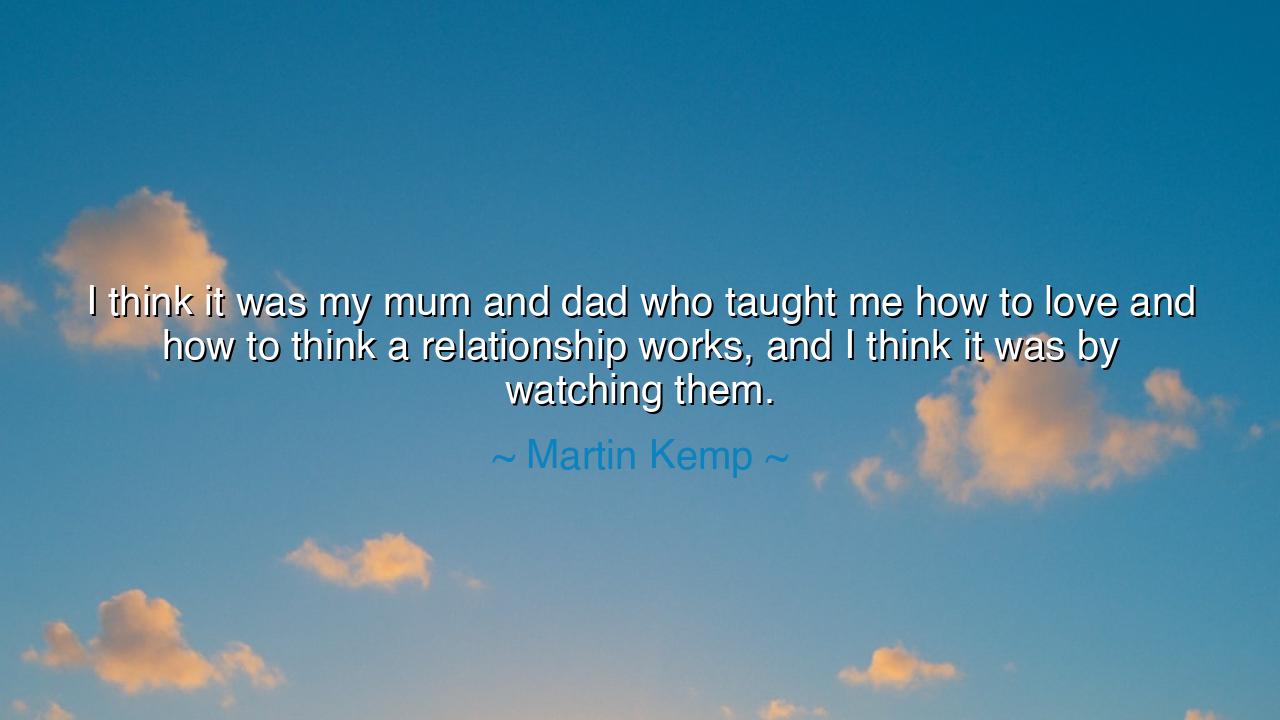
I think it was my mum and dad who taught me how to love and how
I think it was my mum and dad who taught me how to love and how to think a relationship works, and I think it was by watching them.






“I think it was my mum and dad who taught me how to love and how to think a relationship works, and I think it was by watching them.” — Martin Kemp
Thus spoke Martin Kemp, the musician and actor, whose words shimmer with quiet reverence for the two figures who first showed him what it means to love and be loved. His reflection is not wrapped in grandeur, but in truth — the truth that the foundations of love are not taught through words, but through example. In this, his quote carries an ancient wisdom: that the family, humble and familiar, is the first and greatest school of the human heart. What we learn there — in the simple gestures between a mother and a father — shapes the way we later build our own worlds of affection, trust, and companionship.
The origin of this quote lies in the life of Kemp himself, a man raised in a home where love was not an abstraction, but a living practice. His parents, ordinary in circumstance yet extraordinary in devotion, gave him a model of partnership grounded in patience, humor, and loyalty. As he watched them — not as heroes of myth, but as everyday people facing life’s quiet struggles — he absorbed the truth that real love is not perfection, but perseverance. It is not spoken in grand declarations, but whispered daily in acts of kindness, in forgiveness after quarrels, in shared laughter at the end of weary days.
This wisdom echoes the teachings of the ancients. In the days of Aristotle, it was said that virtue is learned not by instruction, but by imitation. Just as a child learns to speak by listening, so too does one learn to love by witnessing love. No book, no sermon, no command can teach what a single moment of tenderness between two souls can reveal. When a son or daughter sees a father’s quiet respect for his wife, or a mother’s steadfast care for her husband, they learn the sacred balance of giving and receiving — the rhythm of partnership that becomes the heartbeat of their own future love.
Consider the example of Marcus Aurelius, the philosopher-emperor, who in his Meditations honored his parents for shaping his moral compass. He wrote of his mother’s humility and devotion, and of his father’s dignity and integrity. Though he ruled an empire, he knew that his truest education came not from scholars or statesmen, but from the living example of those who raised him. Kemp’s words echo this timeless truth: that the roots of love — and all virtues — begin in the home, in the quiet observation of those who came before us.
Yet there is something even deeper in Kemp’s reflection — a sense of gratitude, and the recognition that love is a legacy. When he says he learned love by “watching” his parents, he acknowledges the invisible inheritance they passed on. Love, after all, is not a thing one can give or take; it is a way of being that is absorbed, like sunlight through the skin. The gentle patience of a mother, the steadfast care of a father — these leave impressions that last beyond their lifetimes, shaping not only their children but the generations that follow. In this way, every act of love becomes eternal.
There is also humility in his words — the humility to admit that what is most profound is often learned by observation, not mastery. He does not claim to have invented his understanding of relationships; he attributes it to the simple act of watching. This is wisdom in its purest form: to recognize that one learns by seeing, by listening, by honoring the experiences of those who walked before us. In this age of noise and haste, his reflection calls us back to the sacred stillness of attention — to look closely at the love around us, for in it lies the blueprint of every meaningful connection we will ever form.
Let this, then, be the lesson: that love is taught not by command, but by conduct. If you wish to teach your children how to love, do not lecture them on romance or loyalty; show them. Treat your partner with gentleness. Speak truthfully. Forgive quickly. Laugh often. The eyes of your children are always watching — and through you, they will learn how to build their own temples of affection and trust.
So, my child of the future, remember these words of Martin Kemp. Look to the love that raised you, whether it was perfect or flawed, and learn from it. Honor your parents, not only in name, but by carrying forward the values they lived. And when your time comes to love — to build a family, to raise children, to shape the hearts of others — remember that you are not starting from nothing. You are continuing a chain, ancient and sacred, forged from countless acts of tenderness passed down through time. For love, once witnessed, never dies; it is reborn in every heart that chooses to live it anew.






AAdministratorAdministrator
Welcome, honored guests. Please leave a comment, we will respond soon